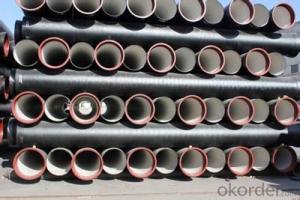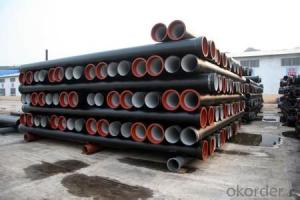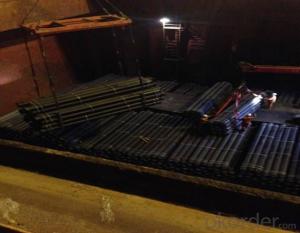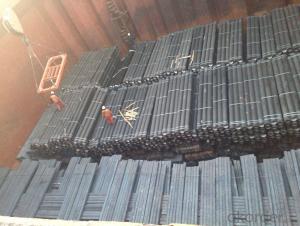DUCTILE IRON PIPE K8 DN250
- Loading Port:
- China Main Port
- Payment Terms:
- TT OR LC
- Min Order Qty:
- -
- Supply Capability:
- -
OKorder Service Pledge
OKorder Financial Service
You Might Also Like
Ductile Iron Cast Pipe is without any defects compare with tradition casting tech, which has many advantages particularly as follow:
(1) High density. In the "vertical upward casting" process, the melt iron of centre liquid column in center crystallizer is continuously feeding for volume shrinkage caused by condensation tube at outer circumference , which lead to be free of shrinkage porosity.
(2) High purity. When melt iron pouring, the mixed impurities such as gas, dross, sand grain which are lighter than melt iron could be eliminated at furnace mouth, its impossible to enter into the crystallizer through the channel, so the melt iron into the crystallizer is very pure.
(3) Strength with toughness. The cooling speed provided by continuous crystallizer is 30 times than sand casting and 5 times than centrifugal casting, and doesn't produce white iron, the eutectic cell volume of continuous cast iron is one eighth to one tenth compare with traditional cast iron. The density of graphite nodule in ductile iron can reach 300-700 pcs/mm2. Therefore, all reason above improve the strength and toughness of continuous cast iron.
(4) Free machining. The high speed cooling make the hardening phase (such as boride, steadite) not appear like reticular, massive or thick, but diffuse like fish bone and pane in shape, moreover, there are tiny graphite flakes inlaid hardening phase. It's free machining in BrinellHardness the range of 250-300HB. However, the Brinell Hardness of 250 is top limit to common metal materials.
(5) Uniform composition of tube wall. The convection mixing of liquid column caused by marching type drawing in crystallizer make the composition of tube wall well-distributed, and concentration gradient very little.
(6) High productivity. To the wall thickness of tube under 10mm, the speed of continuous casting is 1 meter/min, to the wall thickness of tube under 20mm, the speed of continuous casting is 0.5 meter/min, which is high efficiency that centrifugal or other casting tech couldn't reach.
- Q:Can ductile iron pipes be used in nuclear power plants?
- Ductile iron pipes are suitable for use in nuclear power plants due to their improved flexibility and strength compared to traditional cast iron pipes. They are known for their durability, resistance to corrosion, and ability to withstand high pressure and temperature conditions. These pipes are a reliable and robust choice for transporting water, coolant, and other fluids in nuclear power plants. However, it is crucial to consider the specific requirements and regulations of each power plant before selecting the pipe material. It is necessary to ensure proper testing, certification, and compliance with nuclear industry standards to guarantee the safe and efficient operation of the power plant.
- Q:What is ductile iron pipe?
- Ductile cast iron is defined using the above number 18 by adding nodulizer, after centrifugal ductile cast iron machine centrifugal cast pipe, ductile iron pipe (called [span]Ductile Cast Iron Pipes), referred to as ball pipe, ductile iron pipe and ductile iron pipe etc..
- Q:Can ductile iron pipe be used for hydroelectric power generation?
- Hydroelectric power generation is made possible with the use of ductile iron pipes. Ductile iron, a type of cast iron known for its strength, durability, and resistance to corrosion, is well-suited for a range of applications, including the construction of hydroelectric power generation systems. One specific application of ductile iron pipes in hydroelectric power plants is for water conveyance. These pipes, commonly referred to as penstocks, play a vital role in transporting water from the reservoir to the turbines. Given the high pressure and flow rates involved, ductile iron pipes are capable of withstanding these demanding conditions. Moreover, the resistance of ductile iron pipes to corrosion is particularly essential in hydroelectric power generation. The water used in this process can be highly corrosive due to its composition and the presence of impurities. By utilizing ductile iron pipes, the system remains sturdy and durable over time, resulting in reduced maintenance and replacement expenses. Furthermore, the versatility of ductile iron pipes allows for easy joining using different methods such as flanged, mechanical, or push-on joints. This facilitates efficient and reliable installation, ensuring the integrity of the water conveyance system in hydroelectric power plants. In conclusion, ductile iron pipe is a suitable choice for hydroelectric power generation due to its strength, durability, corrosion resistance, and ease of installation. Its utilization in penstocks and other water conveyance systems contributes to the efficient and dependable operation of hydroelectric power plants.
- Q:What are the different accessories available for ductile iron pipe?
- There are several accessories available for ductile iron pipe, including but not limited to, flange adaptors, couplings, valves, fittings, joint restraints, gaskets, and tapping sleeves. These accessories help in connecting, repairing, and maintaining ductile iron pipe systems.
- Q:What is the expected hydraulic efficiency of ductile iron pipes?
- The expected hydraulic efficiency of ductile iron pipes can vary depending on several factors including pipe diameter, roughness of the pipe surface, flow rate, and length of the pipe. However, ductile iron pipes are generally known to have excellent hydraulic efficiency. Ductile iron pipes have a smooth inner surface, which reduces frictional losses and allows for efficient water flow. The smoothness of the pipe surface helps minimize energy losses due to turbulence and resistance. Additionally, ductile iron pipes are designed to have a consistent and uniform internal diameter, which further enhances their hydraulic efficiency. Studies have shown that ductile iron pipes can achieve hydraulic efficiencies ranging from 85% to 95%. This means that a significant portion of the energy put into the system is effectively transferred to the water, resulting in minimal losses. It is important to note that the hydraulic efficiency of ductile iron pipes can be influenced by factors such as corrosion, scaling, and sediment buildup over time. Regular maintenance and proper cleaning can help maintain the hydraulic efficiency of ductile iron pipes. Overall, ductile iron pipes are considered to be highly efficient in terms of hydraulic performance and are widely used in water distribution systems due to their ability to deliver water with minimal energy losses.
- Q:Can ductile iron pipes be used for water distribution networks?
- Yes, ductile iron pipes can be used for water distribution networks. Ductile iron pipes are highly durable, corrosion-resistant, and have a long lifespan, making them suitable for transporting water over long distances. Additionally, their flexible nature allows them to withstand ground movement and vibrations, making them a reliable choice for water distribution networks.
- Q:How do ductile iron pipes handle heavy traffic loads?
- Ductile iron pipes possess exceptional durability and have the ability to effortlessly withstand heavy traffic loads. This is primarily attributed to their remarkable strength and flexibility. The incorporation of graphite nodules in the composition of ductile iron allows for greater flexibility compared to traditional cast iron pipes. This enhanced flexibility empowers the pipes to endure substantial traffic loads, including the weight of vehicles traversing over them. Moreover, ductile iron pipes exhibit an elevated load-bearing capacity, enabling them to bear significant weights without experiencing any deformation or structural failure. Consequently, they are well-suited for deployment in areas characterized by heavy traffic, such as highways, bridges, and industrial sites. Furthermore, ductile iron pipes showcase exceptional resistance to external forces, such as vibrations and impacts. These pipes can effectively absorb and distribute these forces across the entire pipe network, thereby averting any potential damage and preserving the overall structural integrity. In conclusion, ductile iron pipes are explicitly engineered to manage the demands imposed by heavy traffic loads. Their strength, flexibility, and load-bearing capacity render them a dependable choice for infrastructure projects where durability and longevity are of utmost importance.
- Q:Are ductile iron pipes suitable for wastewater systems?
- Indeed, wastewater systems can utilize ductile iron pipes. Ductile iron, renowned for its robustness and durability, exhibits resistance against corrosion and can endure the arduous conditions typically encountered in wastewater systems. Its exceptional tensile strength enables it to withstand the pressure and stress resulting from the movement of wastewater. Furthermore, the installation of ductile iron pipes is effortless, and their longevity ensures a cost-effective solution for wastewater systems. In conclusion, ductile iron pipes represent a dependable and appropriate choice for transporting wastewater in diverse applications.
- Q:How can the ductile iron pipe be tested?
- Pipe in water pressure test, step by step step by step step up, and each time the boost value is 0.2 MPa, in each time after the boost, the heart must be determined after the voltage regulator can continue to step up
- Q:Are ductile iron pipes suitable for wastewater treatment plants?
- Ductile iron pipes are highly suitable for wastewater treatment plants. They possess exceptional strength and durability, making them resistant to corrosion. Consequently, these pipes are an excellent choice for managing wastewater, which often contains corrosive elements. Moreover, ductile iron pipes boast remarkable tensile strength and can endure high pressure, critical for the transportation of wastewater in treatment plants. The flexibility of these pipes also permits easy installation and maintenance, ultimately reducing both cost and time required for wastewater treatment plants. In summary, ductile iron pipes are extensively utilized in wastewater treatment plants due to their durability, resistance to corrosion, and their ability to handle the challenging conditions present in such facilities.
1. Manufacturer Overview |
|
|---|---|
| Location | |
| Year Established | |
| Annual Output Value | |
| Main Markets | |
| Company Certifications | |
2. Manufacturer Certificates |
|
|---|---|
| a) Certification Name | |
| Range | |
| Reference | |
| Validity Period | |
3. Manufacturer Capability |
|
|---|---|
| a)Trade Capacity | |
| Nearest Port | |
| Export Percentage | |
| No.of Employees in Trade Department | |
| Language Spoken: | |
| b)Factory Information | |
| Factory Size: | |
| No. of Production Lines | |
| Contract Manufacturing | |
| Product Price Range | |
Send your message to us
DUCTILE IRON PIPE K8 DN250
- Loading Port:
- China Main Port
- Payment Terms:
- TT OR LC
- Min Order Qty:
- -
- Supply Capability:
- -
OKorder Service Pledge
OKorder Financial Service
Similar products
New products
Hot products
Related keywords





























